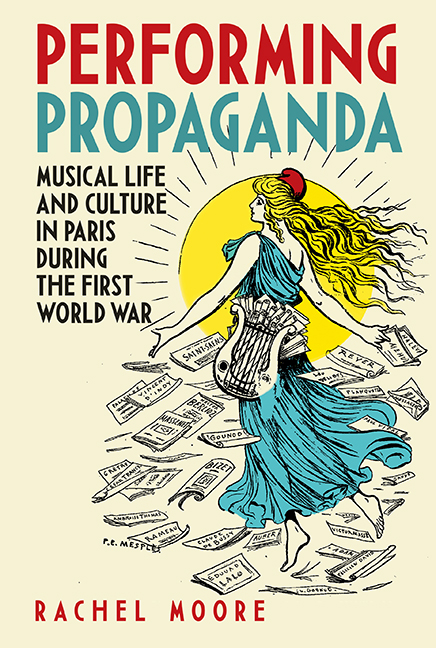 Performing Propaganda: Musical Life and Culture in Paris during the First World War
Performing Propaganda: Musical Life and Culture in Paris during the First World War Book contents
- Frontmatter
- Contents
- List of Illustrations
- List of Tables
- Acknowledgements
- List of Abbreviations
- Introduction
- 1 Musical Institutions on the Home Front
- 2 The Origins of Wartime Musical Propaganda: From the Written Word to Performing Globetrotters
- 3 Saint-Saëns's Germanophilie as a Propaganda Prototype
- 4 Propaganda on the Concert Stage: The Matinées Nationales
- 5 Creativity and Compromise at the Opéra
- 6 Music Publishing and the Édition Française de Musique Classique
- Conclusion
- Bibliography
- Index
- Miscellaneous Endmatter
2 - The Origins of Wartime Musical Propaganda: From the Written Word to Performing Globetrotters
Published online by Cambridge University Press: 19 July 2019
- Frontmatter
- Contents
- List of Illustrations
- List of Tables
- Acknowledgements
- List of Abbreviations
- Introduction
- 1 Musical Institutions on the Home Front
- 2 The Origins of Wartime Musical Propaganda: From the Written Word to Performing Globetrotters
- 3 Saint-Saëns's Germanophilie as a Propaganda Prototype
- 4 Propaganda on the Concert Stage: The Matinées Nationales
- 5 Creativity and Compromise at the Opéra
- 6 Music Publishing and the Édition Française de Musique Classique
- Conclusion
- Bibliography
- Index
- Miscellaneous Endmatter
Summary
WRITING in the music periodical La rampe in June 1916, the critic Jean Poueigh made reference to the ‘audacious globetrotters’ which French musicians had become since 1914. Despite the increasing risks the war presented for international travellers, Poueigh noted that chamber groups, orchestras, and operatic and theatrical troupes were increasingly to be seen abroad, promoting the culture of their native country and raising money for charitable causes. Whilst performance tours abroad were nothing new in the early twentieth century, from 1914 they quickly became a key part of the home-front war effort as musicians, critics, and – much later – government officials, increasingly saw the potential of artistic promotion to influence global views of France. Such musical propaganda was one component of broader cultural propaganda initiatives during a period which saw the birth of organised cultural propaganda on a large scale.
Within France, convincing the masses of the importance of the war effort was a method by which to boost civilian morale amidst the hardships of the wartime climate, stirring up patriotic sentiment to convince the population that they were not suffering in vain and, more importantly, that they were not suffering alone but as a nation. Sustaining civilian morale was crucial during a ‘total’ war in which the ability of civilians to hold out appeared as important to victory as the military effort. But propaganda was equally important as a means to influence wider global perceptions of the nation, where convincing people of the justness of the French war effort had more obvious implications for military and political goals: the function of international propaganda as a means to publicise the French war cause could play an important part in attracting international support, with the potential to secure military and financial aid from neutral – and potential allied – countries.
Musical tours abroad by Poueigh's ‘musical globetrotters’ were just one aspect of culture which was employed to propagandistic ends during the First World War: written propaganda by academicians often included content on musical topics; wartime concerts characteristically included nationalistic speeches; and sales of musical editions served as propaganda. These different forms of propaganda, examined in the following chapters, were each motivated by a range of economic, social, and political goals which changed and developed as the conflict unfolded and as the benefits of propaganda to the nation's war effort became clearer.
- Type
- Chapter
- Information
- Performing Propaganda: Musical Life and Culture in Paris during the First World WarMusical Life and Culture in Paris during the First World War, pp. 45 - 64Publisher: Boydell & BrewerPrint publication year: 2018


